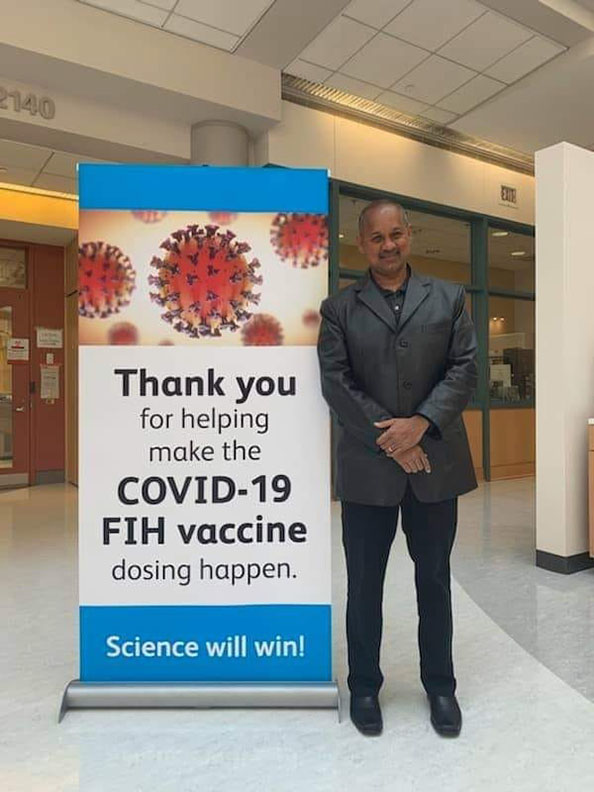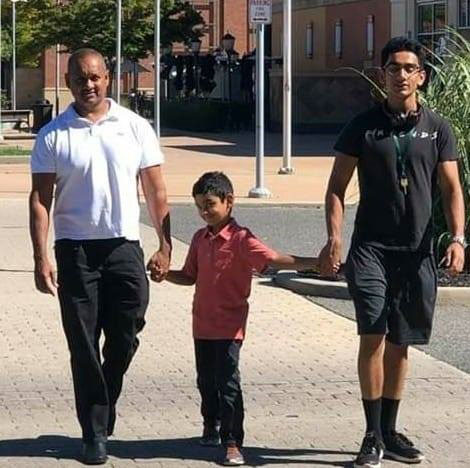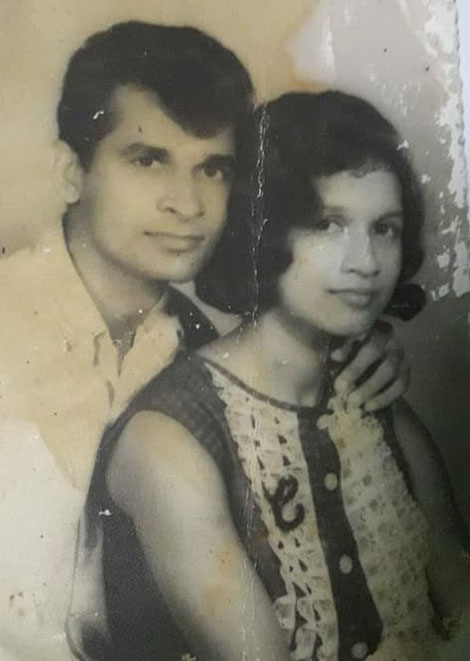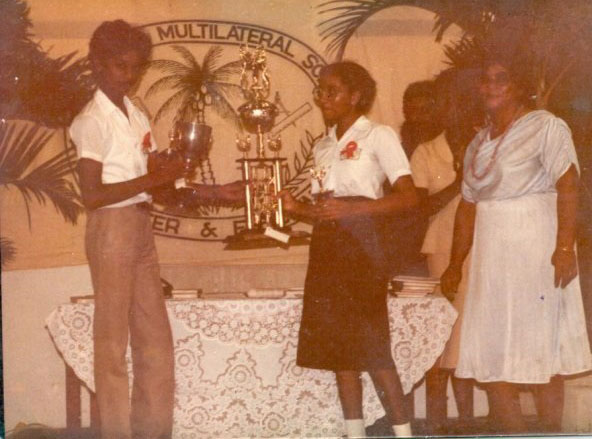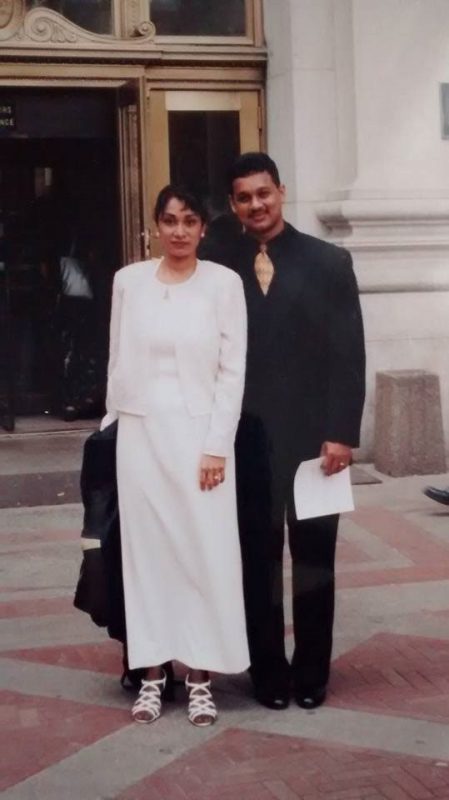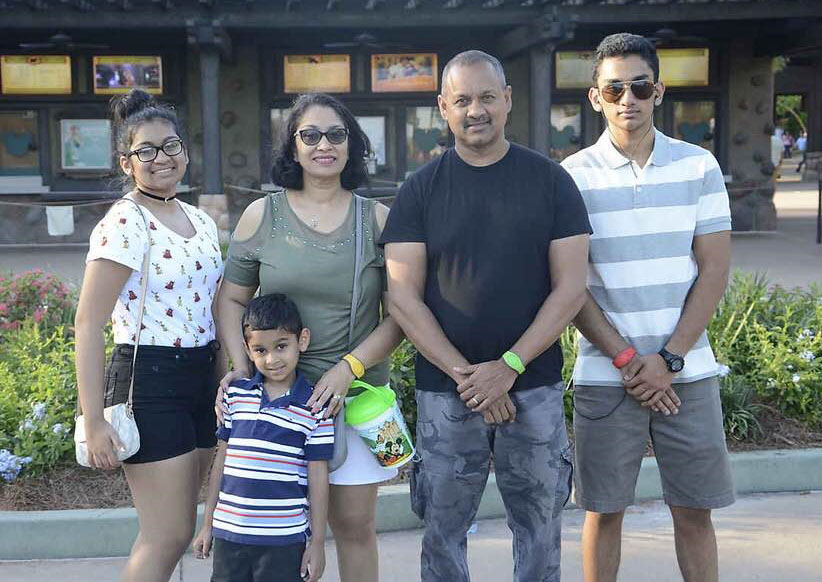In the quiet village of Wakenaam many, many years ago, two teachers gave their eleven-year-old son a book as a birthday gift. That gift led Vidia Roopchand to the path of science and today he is a scientist employed with an American company and is actively involved in developing a vaccine for the novel coronavirus that has been wreaking havoc in the world.
Roopchand, a father of three, is employed with Pfizer Inc, an American multinational pharmaceutical corporation headquartered in New York City, and which is currently developing a vaccine for COVID-19 in partnership with BioNTech.
In an interview with Stabroek Weekend, Roopchand, who wants to one day give back to the country he left about 50 years ago, spoke about his journey to becoming a scientist and not a journalist as he had first envisioned and his role in developing the vaccine.
“For my eleventh birthday my parents gave me a book titled ‘The How and Why Wonder Book of Chemistry’ and that book just floored me. I could not put it down. It was also just around the time that my dad started giving me books by Jules Verne to read, so science was stirring my soul,” Roopchand said of his journey to becoming a scientist.
Now today he is set to be part of history should Pfizer’s vaccine become a reality since this is something the entire world is eagerly looking to forward to as COVID-19 continues to take a toll on countries across the globe. There is no cure for the novel coronavirus; its various symptoms are what are treated, and some persons eventually recover.
For Roopchand, the virus has personally impacted him as he has lost an uncle and two good friends to it.
Roopchand received a BSc in Chemistry from the University of Guyana and holds two masters’ degrees—one in Immunology from New York Medical College and one in Chemical Engineering from Columbia University.
A lot of pressure
Working on the vaccine, Roopchand said, creates a lot of pressure for him, especially when he sees the mortality projections which are being generated by the epidemiology models.
“I am even more concerned about the projections for the developing world where the health care system can be easily overwhelmed,” Roopchand said.
His wife Nadia is a registered nurse in New York, and is on the frontlines of the efforts to save lives amidst the the pandemic. According to the 53-year-old scientist, what his wife tells him, “scares me, but it also motivates me”. They are both considered essential workers.
He, however, finds comfort in the global effort and knowing that there are multiple organisations using multiple approaches to develop a COVID-19 vaccine. He said he is especially encouraged by how much data is being shared in the public domain so there is relative transparency on what different technological approaches are being attempted.
As to the vaccine being developed by Pfizer, Roopchand said it uses a technology called mRNA – or messenger RNA. He said it is a molecule, composed of nucleotides linked in a unique order to convey genetic information for the cells to produce the proteins or antigens encoded by the mRNA.
“Once mRNA in a vaccine is inside of the body’s cells, the cells use their genetic machinery to translate the genetic information and produce the antigens encoded by the mRNA vaccine. The program includes four experimental vaccines in different mRNA formats,” Roopchand related.
That process makes the vaccine scalable and it can then be manufactured quite rapidly if it works.
A believer in God, which he said some might find surprising as they think scientists don’t believe in God, Roopchand said he trusts that God will guide them in their quest for a vaccine.
He believes that the scientists who are developing COVID-19 vaccines both within Pfizer and outside have a sense of urgency and camaraderie as they are all in it together.
“My belief is that whichever vaccine succeeds in the clinic is going to be manufactured by multiple organisations and distributed by multiple organisations. I am also confident that I have the correct skill sets to be part of this effort and that my life and professional experiences have prepared me to be part of this. My number has been called and I am stepping up,” he said.
Speaking directly to his involvement at the company, Roopchand disclosed that he has expertise in chemical engineering and immunology and as such usually fit into the role which is needed the most.
In the past, he has lead the cell culture team for vaccine antigen expression which is used to determine if the correct vaccine protein is being expressed and also assisted in some of the immunological assays which are being used to evaluate the vaccine.
As to when the vaccine will become a reality Roopchand stated that it is not possible to make predictions right now. However, the data coming out of the clinical trials will guide the company.
“I understand the gravity of the situation, but we have to be data driven. I liken these times to being in a ship in a storm: we have to let the instruments guide us and we have to believe in our instruments. The clinical data will guide us. We cannot let the sense of urgency interfere with a thorough process,” Roopchand said.
Wild and free
Roopchand was 23 years old when he left Guyana and he described his years in the island of Wakenaam as “wild and free”.
In the small community, everyone knew everyone, and they all lived like family, which the scientist said is a “good thing”. As a child he fished, played cricket, and pitched marbles along with the many other activities that make life in the country fun. He named the many families he interacted with and who played a part of in his childhood. His family has a coconut and banana farm and as such most of his weekends were spent there. He left their home at 11 for the Anna Regina Multilateral School (ARMS) and only returned for holidays.
He recalled that while both of his parents were teachers, but they were not strict and instead gave him and his siblings their own free will to find their way. While they were capable of disciplining their children, they rarely did.
“I think that after spending all day as teachers they just wanted to be regular people at home. There were some things that they did not compromise on though, the homework had to get done and the farm chores had to get done,” he said.
His brother, Ricky Roopchand, is the manager of Hope Estate, while his sister, Karishma Roopchand, who was a teacher, died three years ago.
America
Roopchand said his move to America was not as tough as he thought it was going to be as relatives and friends residing in that country made it a lot easier for him.
His uncle, Roland Binda, took him around New York and showed him how to use the mass transit system. He lived for a little over two years with the Bhoodai family who used to be his neighbours in Wakenaam.
While there was some culture shock because of the pace of New York, he got used to it after a while.
“I was amazed at the diversity of New York City—everyone was from somewhere else. I found a lot of comfort when I realized that the books they used here were the same books which we studied at UG. Good old ‘Organic Chemistry’ by Morisson and Boyd was my refuge,” he recalled.
Before Pfizer, Roopchand worked at the New York University Medical Center in the cell culture core group as a research assistant. He was growing HeLa cells (obtained from Henrietta Lacks) for antioxidant testing back in 1992 when Vitamin A, Taxol and Tamoxiphen were being evaluated as cancer preventative agents. He said he gained a lot of experience in large scale cell culture and bioreactor operations, which was why he got hired in the biopharmaceutical industry.
This October will be 27 years since he joined Pfizer where he started as an entry-level research scientist and over the years moved up the ranks.
“I got bitten by the vaccine bug very early because I was hired to work in the polio vaccine manufacturing facility, and I interacted very often with public health officials from around the world. That was in 1993, and the projection was that polio was going to be eradicated by 1998. I remember the public health official from Egypt showing the dramatic decrease in polio infections that our vaccine would make possible. I was an instant convert,” he said of his journey.
Family
“I met my wife Nadia in high school [ARMS]. We were not high school sweethearts. We have three children, Joshua who is 19, Rachel who is 17 and Daniel who is 8. We have been married for 20 years,” Roopchand said.
Looking to the future, he said he wants to see his children graduate college and become professionals and he would like to complete his doctorate, even though he does not see how it is going to do anything for his career; he still would like to have it.
Roopchand also wants to be part of a mentoring programme as he believes he could demystify concepts in Organic Chemistry, Immunology and Differential Equations for children who are intimidated by such subjects. He could potentially be part of a STEM initiative in Guyana, because he has worked in the biopharmaceutical industry for a long period and has knowledge to share, especially about the need for soft skills which are not taught in college.
He has considered coming to Guyana to teach a semester of chemical engineering or immunology at UG, but that will have to wait until his two eldest children, Josh, and Rachel, are finished with college and his youngest, Daniel, is at least in college.
“I am a parent, a husband and a scientist! I love challenges and I love technology, nothing excites me more that the possibility of using biotechnology to improve human health by creating better medicines and vaccines. I will never accept the status quo in medicine, I want to always make better medicines,” he elaborated.
He said he is most fulfilled professionally when he sees reduced death and disease because of a vaccine he helped to bring to the clinic.
“I think that the balance between family life and professional life must be struck and that one should not suffer because of the other. I love to see people flourish. I love to nurture human potential. I am most fulfilled personally when someone who has not seen my wife since before she met me tells me how happy my wife seems,” Roopchand said.
“I want to help to save the world, but I don’t care about being given credit for it. I want to be like Agent K as played by Tommy Lee Jones in the movie ‘Men in Black’. Most male scientists want to be either Indiana Jones or Tony Stark [Iron Man] but I want to be Agent K!”

